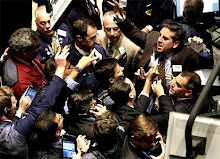Wednesday, August 1, 2012
Bill Bross on Equities
The bond king says stocks are dead.
Bill Gross, Pimco’s co-founder and co-chief investment officer, says stock investors should think again about the age-old “buy-and-hold” investing mantra. He says consistent, annual returns are a thing of the past.
“The cult of equity is dying,” Bill Gross wrote in his August Investment Outlook. “Like a once bright green aspen turning to subtle shades of yellow then red in the Colorado fall, investors’ impressions of ‘stocks for the long run’ or any run have mellowed as well.”
Gross points out stocks have averaged a 6.6% annual gain on an inflation-adjusted basis since 1912. But he labels that rate of return as an “historical freak” that isn’t likely to be duplicated anytime soon, due to slowing economic growth around the globe. From Gross:
“The 6.6% real return belied a commonsensical flaw much like that of a chain letter or yes — a Ponzi scheme. If wealth or real GDP was only being created at an annual rate of 3.5% over the same period of time, then somehow stockholders must be skimming 3% off the top each and every year. If an economy’s GDP could only provide 3.5% more goods and services per year, then how could one segment (stockholders) so consistently profit at the expense of the others (lenders, laborers and government)?”
Gross wonders how stocks can keep appreciating at a 6.6% annual rate in this “new normal” economy, in which GDP growth remains stubbornly low.
U.S. second-quarter GDP, reported on Friday, grew at a meager 1.5% rate. That growth rate is well below historical standards, and is partly why the unemployment rate remains stuck above 8%.
“The legitimate question that market analysts, government forecasters and pension consultants should answer is how that 6.6% real return can possibly be duplicated in the future given today’s initial conditions which historically have never been more favorable for corporate profits,” Gross says. He says it cannot, “absent a productivity miracle that resembles Apple’s wizardry.”
n addition to being pessimistic on stocks, Gross is also down on bonds. “What you see is what you get more often than not in the bond market, so momentum-following investors are bound to be disappointed if they look to the bond market’s past 30-year history for future salvation, instead of mere survival at the current level of interest rates,” Gross says.
With lower expected returns for stocks and bonds, the average American is the big loser in this new investing environment.
“The commonsensical conclusion is clear: If financial assets no longer work for you at a rate far and above the rate of true wealth creation, then you must work longer for your money, suffer a haircut on your existing holdings and entitlements, or both,” Gross says.
Investors looking for a “magic potion” that will solve the world’s problems shouldn’t hold their breath. Policy makers in the past have tried to “inflate their way out of the corner,” he says.
There is rampant speculation that the Fed will embark on another significant bond-buying program to juice the economy. Rumors of QE3 have flooded the market for quite some time, and some investors are hoping the Fed will announce something at the end of its two-day policy meeting, which concludes on Wednesday.
ECB President Mario Draghi boosted expectations last week when he said the central bank would do “whatever it takes” to preserve the euro. His bold comments raised the bar for Thursday’s meeting.
But Gross isn’t optimistic any of these central-bank policies will have positive long-term impacts.
“Unfair though it may be, an investor should continue to expect an attempted inflationary solution in almost all developed economies over the next few years and even decades,” Gross says. “Financial repression, QEs of all sorts and sizes, and even negative nominal interest rates now experienced in Switzerland and five other Euroland countries may dominate the timescape.
REGN
stock looks like it wants to go higher- I am not playing it personally just one I got on radar.
Machines are not perfect
Firmly machines are made by man!
Why the uproar and confusion when trading machines go haywire. This morning blimp is nothing new and it is expected as long as we use machines more and more in the financial system. As usual who gets hurt is the small guys.
Subscribe to:
Comments (Atom)


